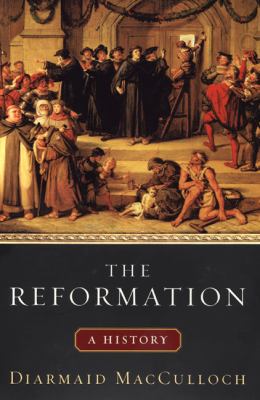
by Diarmaid MacCulloch
Library Journal: Does the world really need another general history of the Reformation? MacCulloch (history of the Church, Oxford Univ.; Thomas Cranmer: A Life, etc.) thinks so, believing that contemporary scholarship needs wider dissemination. To that end, he has produced the definitive survey for this generation. As in similar studies, religious and political disputes are covered thoroughly. What sets this work apart is the sweep of its coverage, both geographically (from Britain and Ireland in the west to Poland and Lithuania in the east) and chronologically (1490–1700). Also noteworthy is the attention to the movement's social impact on such diverse topics as calendar reform, colonization, family life and sex roles, homosexuality, witchcraft, and more. This well-written book is a joy to read, with new facts and interpretations on nearly every page; still, the work's size and information density will make it slow going for those without a basic knowledge of the subject. With that caveat, this is highly recommended for larger public libraries and academic library collections in European and Christian history.—Christopher Brennan, SUNY Coll. at Brockport Lib. Copyright © Reed Business Information, a division of Reed Elsevier Inc. All rights reserved. Distributed by Syndetic Solutions Inc. Terms
Publishers Weekly: Many standard histories of Christianity chronicle the Reformation as a single, momentous period in the history of the Church. According to those accounts, a number of competing groups of reformers challenged a monolithic and corrupt Roman Catholicism over issues ranging from authority and the role of the priests to the interpretation of the Eucharist and the use of the Bible in church. In this wide-ranging, richly layered and captivating study of the Reformation, MacCulloch challenges traditional interpretations, arguing instead that there were many reformations. Arranging his history in chronological fashion, MacCulloch provides in-depth studies of reform movements in central, northern and southern Europe and examines the influences that politics and geography had on such groups. He challenges common assumptions about the relationships between Catholic priests and laity, arguing that in some cases Protestantism actually took away religious authority from laypeople rather than putting it in their hands. In addition, he helpfully points out that even within various groups of reformers there was scarcely agreement about ways to change the Church. MacCulloch offers valuable and engaging portraits of key personalities of the Reformation, including Erasmus, Luther, Zwingli and Calvin. More than a history of the Reformation, MacCulloch's study examines its legacy of individual religious authority and autonomous biblical interpretation. This spectacular intellectual history reminds us that the Reformation grew out of the Renaissance, and provides a compelling glimpse of the cultural currents that formed the background to reform. MacCulloch's magisterial book should become the definitive history of the Reformation. Copyright © Reed Business Information, a division of Reed Elsevier Inc. All rights reserved. Distributed by Syndetic Solutions Inc. Terms
|

